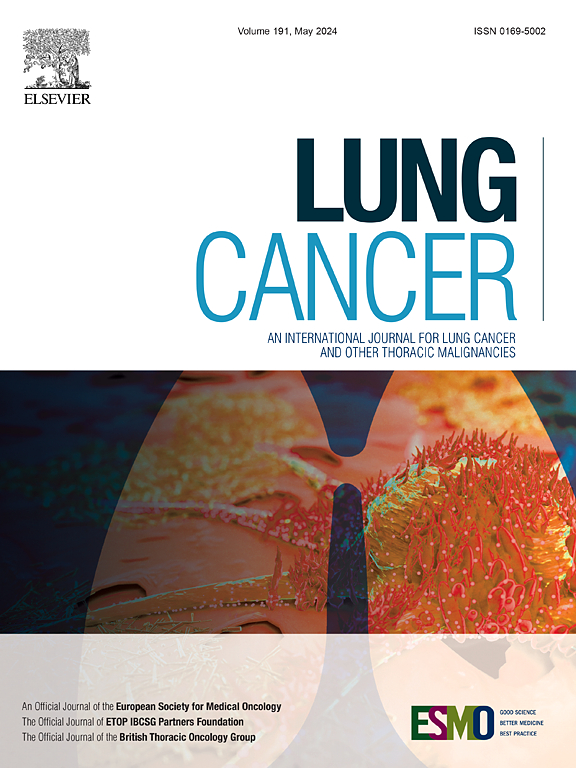根据关键临床试验资格,化疗免疫治疗广泛期小细胞肺癌的长期结果:一项前瞻性队列研究的3年结果
IF 4.5
2区 医学
Q1 ONCOLOGY
引用次数: 0
摘要
背景:化疗免疫疗法是广泛期小细胞肺癌(ES-SCLC)的标准一线治疗方法;然而,其与患者背景相关的实际长期疗效仍不清楚。我们使用最新的大型真实世界前瞻性队列研究了这种关联,该队列的随访时间至少为 3 年:这项前瞻性队列研究在 32 家医院进行,招募了 2019 年 9 月 1 日至 2020 年 9 月 30 日期间接受卡铂、依托泊苷和阿特珠单抗治疗的 ES-SCLC 患者。对随访期至少 3 年的最新数据进行了分析。符合关键3期临床试验资格标准的患者被视为 "符合试验资格":入组的207名患者从开始治疗到数据截止(2023年9月30日)的中位数(范围)时间为42.2(35.8-48.2)个月。大多数患者(89%)的东部合作肿瘤学组(Eastern Cooperative Oncology Group)表现为 0 或 1。符合纳入标准的患者(132 [64%])被归类为符合试验条件的患者。3年无进展生存期(PFS)概率和总生存期(OS)概率分别为6.1%和20.9%。符合试验条件和不符合试验条件的患者的 3 年 OS 概率分别为 26.7% 和 9.5%。符合试验条件的患者群中,获得 3 年 OS 的患者比例(30/132,22.7%)高于不符合试验条件的患者群(5/75,6.7%)(P = 0.003):我们的研究首次记录了ES-SCLC患者化疗免疫治疗后的长期疗效。主要的资格标准对长期疗效有重大影响。这些发现为ES-SCLC患者化疗免疫疗法的实际疗效和临床决策提供了宝贵的见解。本文章由计算机程序翻译,如有差异,请以英文原文为准。

Long-term outcome of chemoimmunotherapy for extensive-stage small-cell lung cancer according to key clinical trial eligibility: 3-year outcomes from a prospective cohort study
Background
Chemoimmunotherapy is the standard first-line treatment for extensive-stage small-cell lung cancer (ES-SCLC); however, its real-world long-term outcomes associated with patient backgrounds are still unclear. We explored this association using an updated large real-world prospective cohort with a minimum follow-up of 3 years.
Methods
This prospective cohort study, conducted across 32 hospitals, enrolled patients with ES-SCLC receiving carboplatin, etoposide, and atezolizumab between September 1, 2019 and September 30, 2020. Updated data with a minimum 3-year follow-up period were analyzed. Patients who met eligibility criteria for pivotal phase 3 clinical trials were considered “trial-eligible.”
Results
The median (range) time from the treatment initiation to data cutoff (September 30, 2023) was 42.2 (35.8–48.2) months for the enrolled 207 patients. Most patients (89 %) had an Eastern Cooperative Oncology Group performance status of 0 or 1. Patients fulfilling the inclusion criteria (132 [64 %]) were categorized as trial-eligible. The 3-year progression-free survival (PFS) probability and overall survival (OS) were 6.1 % and 20.9 %, respectively. The 3-year OS probabilities for trial-eligible and trial-ineligible patients were 26.7 and 9.5 %, respectively. The trial-eligible cohort had a larger percentage of patients achieving a 3-year OS (30/132, 22.7 %) than the trial-ineligible cohort (5/75, 6.7 %) (P = 0.003)
Conclusions
Our study provides the first documentation of the long-term outcomes following chemoimmunotherapy in a large prospective real-world cohort of patients with ES-SCLC. Key eligibility criteria significantly influenced the long-term effectiveness. These findings provide valuable insights into the practical effectiveness of chemoimmunotherapy and clinical decision-making for patients with ES-SCLC.
求助全文
通过发布文献求助,成功后即可免费获取论文全文。
去求助
来源期刊

Lung Cancer
医学-呼吸系统
CiteScore
9.40
自引率
3.80%
发文量
407
审稿时长
25 days
期刊介绍:
Lung Cancer is an international publication covering the clinical, translational and basic science of malignancies of the lung and chest region.Original research articles, early reports, review articles, editorials and correspondence covering the prevention, epidemiology and etiology, basic biology, pathology, clinical assessment, surgery, chemotherapy, radiotherapy, combined treatment modalities, other treatment modalities and outcomes of lung cancer are welcome.
 求助内容:
求助内容: 应助结果提醒方式:
应助结果提醒方式:


